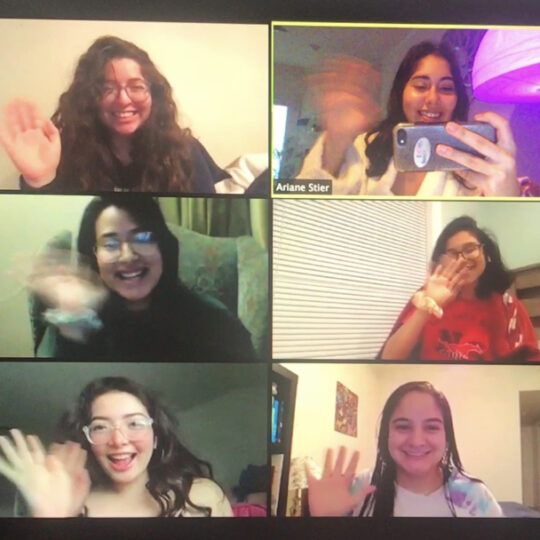We recently interviewed 2020 Latino Media & Arts Studies Senior Thesis Award winner and recent B.A. in Theatre and Dance graduate Ariane Stier. Her project, “Mírame: Deconstructing Latina Representation and Empowerment in Performance,” takes a critical look at the film and theatre industry’s representation of Latinas and advocates for more truthful, complex Latinx characters. Stier discussed her process and plans for the project, as well as her inspirations and goals as a theatre artist who is eager to amplify the voices of those who have been historically silenced.
 Can you tell me a bit about yourself? What lead you to theatre?
Can you tell me a bit about yourself? What lead you to theatre?
My name is Ariane. I’m Peruvian-American, an Aquarius and I grew up in Houston, Texas. In the sixth grade, I started taking theatre classes because it seemed fun and I had been interested in acting but had never tried it out. After my first time on stage, I fell in love with performing and I’ve been pursuing my dream of becoming an actor and theatre-artist ever since. Throughout [my time at the University of Texas at Austin], I’ve discovered other passions I have in classical theatre, comedy, dance, research and recently, working with other women to create our own art. Theatre has been an amazing creative outlet to express myself, connect with others and exchange stories. It’s surreal that I’m here now having just earned my degree. I think a younger Ariane would be proud to see that I stayed true to myself!
Can you share a synopsis of your project “Mírame: Deconstructing Latina Representation and Empowerment in Performance” with me? What were your goals for the end result?
“Mírame” was created over several semesters as part of the B.A. Honors Program in the Department of Theatre and Dance. It is composed of two parts: a research study and creative project. My thesis involved interviewing a cast of six Latina performers in the department. Using these interviews, we collaborated to write “The Mírame Monologues,” an original piece of theatre that spotlights a range of Latina voices and aims to spark conversations about representation in the acting industry. My thesis paper explored these representations in theatre, film and TV, and also analyzed the process of making “The Mírame Monologues.”
This project had me wearing many “hats” – director, researcher, writer, producer and performer. My vision for “Mírame“ was to provide my cast with a platform to share their authentic stories and voices. By making space for Latinas to choose for ourselves what is empowering representation, I believe we can begin to reverse the harmful narratives of us on stage and on screen. After decades of voices like ours being silenced in the industry, we deserve the agency to write, create and produce our stories how we want to.
That’s why my project is named “Mírame,” which translates to “look at me.” We finally want to be seen for who we really are – not the commercialized version of Latinidad that is palatable for most audiences. By making the process of “Mírame“ collaborative and inclusive, it alters the inherent hierarchical power dynamics that usually exist in creative processes. In “Mírame,” we are all producing and creating the show together. Furthermore, each storyteller has total creative control over how their story is both written and performed. Every monologue is unique because they’re written from the lived experiences of the actor.
What inspired you to pick this topic?
I’ve been passionate about this topic for many years, especially as a young aspiring performer who grew up surrounded by stereotypes of my identity in popular media. I rarely saw Latinas playing the complex, multi-dimensional lead roles that I hoped to one day portray. Instead, I consistently saw my identity reduced to a caricature. After years of navigating these narratives, I decided to write about it.
My junior year, The Liberator Magazine published my piece, “The Mythical Latina,” for their September 2018 contest on representation in the media. After my piece was published, I realized how much I wanted to conduct my own original research on this issue and be part of the change I wanted to see in the industry. It was then that I applied to the B.A. in Theatre and Dance Honors Program. I knew that I wanted to find a group of Latinas to be my artistic collaborators and interview each of them in order to gather a variety of perspectives on this topic. As I researched Latina representation more extensively over the next three semesters, I learned how deep-rooted and prevalent this issue is. I loved the thought of making a piece of theatre that celebrates all it can mean to be Latina.

I understand you were planning to have a performance associated with your project that was put on hold because of the pandemic. What was your process and how did it change as a result of the pandemic?
We were set to perform a live production of “The Mírame Monologues” in May 2020. It was also going to be a community event produced in collaboration with the Latinx Theatre Initiative, a student organization on campus. We’ve now moved the project online due to the pandemic.
My process started with holding auditions to cast six performers in the fall [semester] of my senior year. Then, I conducted interview research about their insights and experiences with Latina representation in acting. Based on those conversations, I held individual writing workshops where I guided them through the process of turning interviews into a monologue. I had scheduled group writing workshops for late March and a few weeks of rehearsals as a cast before we opened. Unfortunately, due to [the pandemic], all of that could no longer happen as planned. Once everything moved online, we had to adapt the process. Most of the pieces were already in their final stages by mid-March, so for the rest of the semester, I coordinated group peer edits, individual FaceTime meetings with myself and a few cast dinners over Zoom where we shared the final pieces.
Each performer is [now] sending me footage of their monologue and I’m in the process of editing together a filmed version of “The Mírame Monologues!“ While I still hope that one day we can do a live production, I think moving “Mírame“ online is actually an opportunity to make our project more accessible to other communities and to potentially reach other artists who could feel seen in these stories too. I’m excited for audiences to watch these stories and meet the incredible women in “Mírame.”
Do you have any plans for this project in the future?
Yes! I’ll be posting updates on our Instagram (@themirameproject) and a website is also in the works so people can have access to watch our show. I hope this project can be a framework for other Latinas to extrapolate my findings and spark discussions about representation within their own communities. After “The Mírame Monologues“ is released, my plan is to turn it into an online collective where Latina performers will be able to submit their own stories. I hope to eventually grow “Mírame“ into a platform that amplifies Latinx artists from all over.
What does winning the Latino Media Arts & Studies Senior Thesis Award mean to you?
It’s an honor. I put my heart and soul into this project and so have each of the cast members. It feels great to have all of that hard work be celebrated. The process of creating “Mírame“ has been unlike anything I’ve been a part of. It was my first time fully stepping into the director/producer role and the only time I’ve ever worked with an all Latina cast. It’s been a delight to spearhead a project that lives so close to my experiences and work with such inspirational, passionate and hilarious artists. Sharing stories with these women has been a cathartic and joyful process. They made me feel understood and like I wasn’t alone in my experiences. That’s why it’s necessary to create spaces and lead conversations like this. I am thankful that I got to end my UT experience on such an uplifting note. I hope this project shows other people that their voice matters!
Congratulations on graduating this past semester! Do you have any plans for post-grad life?
Thank you! It’s an exciting milestone, but also a strange time to be graduating in the middle of a global pandemic. My plans for post-grad life are to pursue a career as an actor and working artist. But for now, I’m focusing on [completing] my second degree in public relations and finding ways to hone my passions in the meantime. “Mírame“ has been a great stepping stone for my artistic career because I’ve realized the exact kind of work I want to continue to make. I’m committed to spotlighting real stories, starting conversations and empowering others to speak up. Storytelling is a powerful way to cultivate healing in our communities. No matter what the future holds, I will work to create positive change in this industry by lifting up the stories of those who deserve to be seen and heard.

